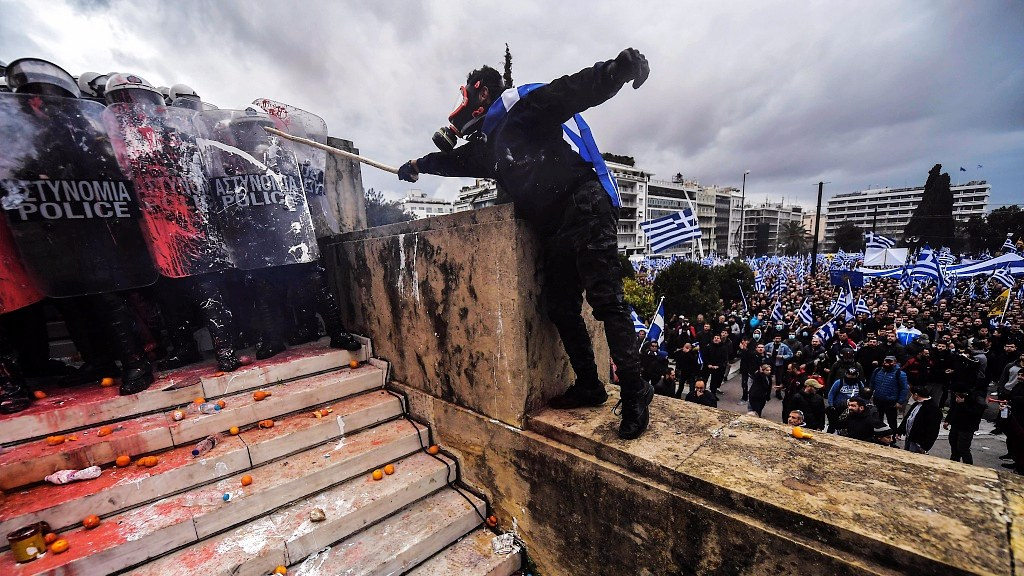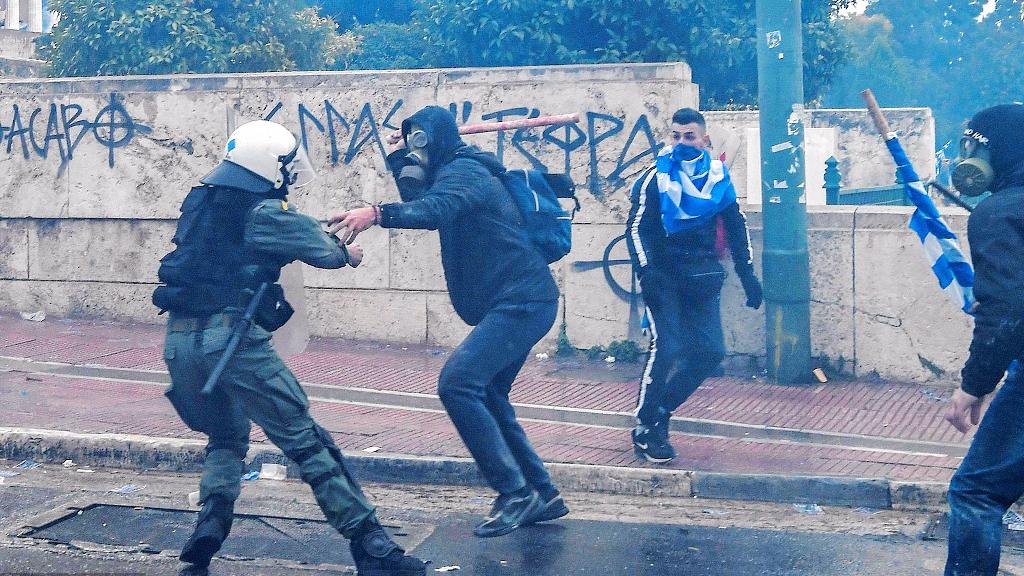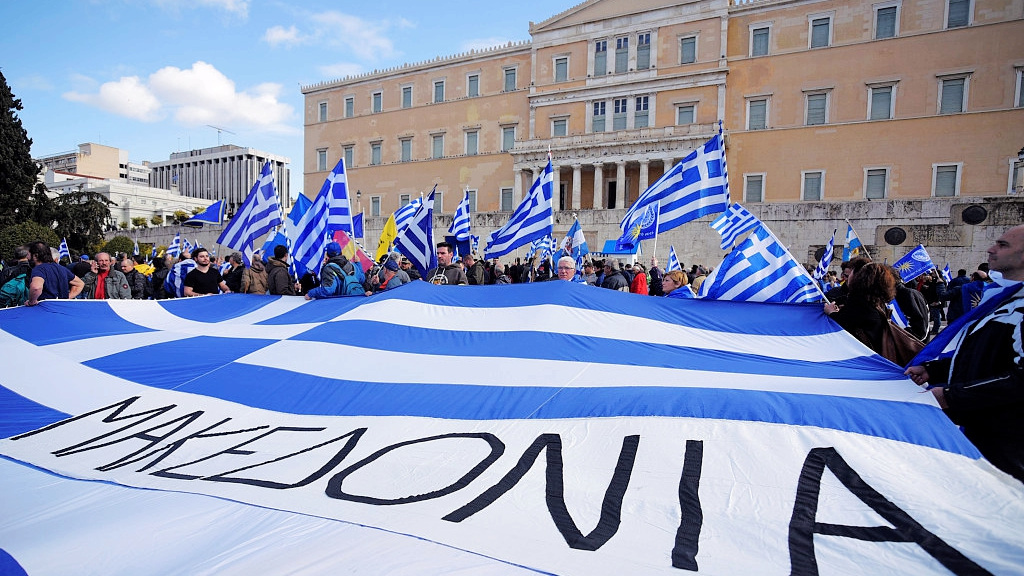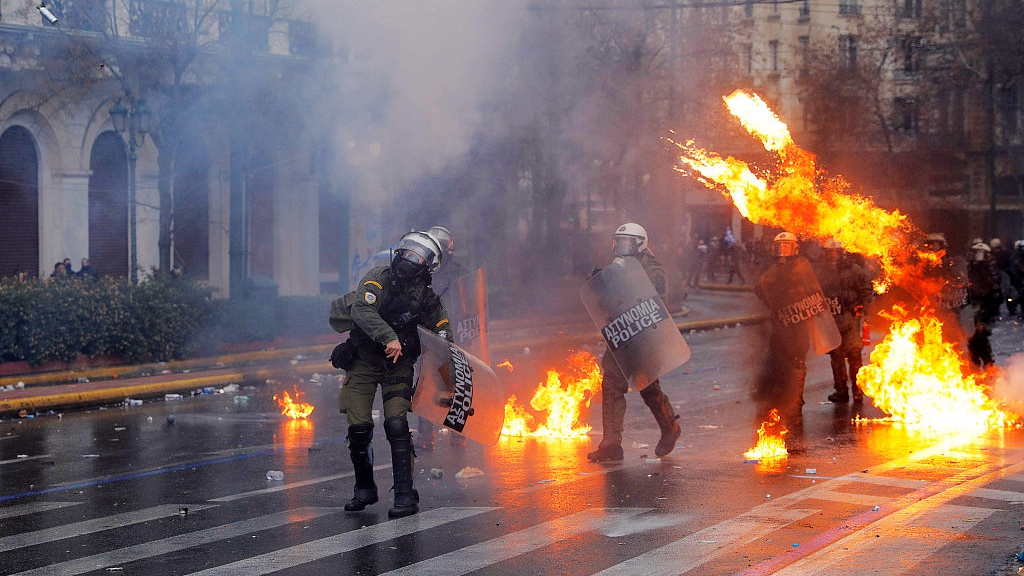02:04

Clashes broke out between police and a group of masked protesters in Athens on Sunday as tens of thousands demonstrated against a name change deal with neighboring Macedonia that the Greek parliament is due to ratify in days.
The violence flared as Greek Prime Minister Alexis Tsipras attempts to face down a political storm over his championing of a landmark agreement with Macedonia aimed at ending a 27-year dispute with Athens over the country's name.
Twenty-five police officers were hurt in the protests, according to a statement from the Greek citizens' protection ministry, while a first-aid station said two protesters were hospitalized with breathing difficulties.
Police estimates put the number of demonstrators at 60,000 while organizers said 100,000 people had arrived for the rally, with hundreds of buses bringing demonstrators, especially from the region of northern Greece that also claims the Macedonia name.

Protesters clash with police in front of the Greek Parliament in Athens on January 20, 2019. /VCG Photo
Protesters clash with police in front of the Greek Parliament in Athens on January 20, 2019. /VCG Photo
Scuffles broke out after about 30 masked youths tried to force the closure of the parliament building, throwing stones and other projectiles. Riot police responded with volleys of tear gas, dispersing the crowd outside the legislature.
The masked youths then set upon journalists at the scene, smashing the equipment of photographers and cameramen, according to an AFP reporter.
According to the government, "the incidents were provoked by extremists, members of the Golden Dawn, who attempted to enter parliament."
"They attacked police with bits of wood and clubs, sending dozens of wounded to the hospital," said a statement from Tsipras.
A wide range of Greek political parties, from the far-right Golden Dawn to the Socialists, oppose the accord to rename Macedonia the Republic of North Macedonia.
But it could nonetheless be approved by the required 151 deputies in the 300-seat parliament in the coming days.
The Prespes Agreement, which aims to end a 27-year-row between Greece and its northern neighbor over the name of Macedonia, has been hailed by the international community as a historic deal and the two countries' prime ministers, Tsipras and Zoran Zaev, have gained international praise for their determination to push through with it.
Yet, they have been both facing fierce opposition within their countries.
'Greek vs Slav'

Protesters hold a Greek flag as they take part in a demonstration against the agreement reached by Greece and Macedonia to resolve a dispute over the former Yugoslav republic's name, in Athens, Greece, January 20, 2019. /VCG Photo
Protesters hold a Greek flag as they take part in a demonstration against the agreement reached by Greece and Macedonia to resolve a dispute over the former Yugoslav republic's name, in Athens, Greece, January 20, 2019. /VCG Photo
Flag-waving demonstrators had created a sea of blue and white on Syntagma square near the parliament, while much of the city center was closed to traffic and some metro stations shut as a precaution.
"There is only one Macedonia, the Greek Macedonia," read a sign in Greek and English held by Christina Gerodimoun, in her 30s, at the protests.
"This government is a government of traitors," she said in reference to a coalition led by Tsipras, who brokered the deal with Macedonian counterpart Zaev in June.
The crowd was monitored by nearly 2,000 police, equipped with drones and helicopters, a police source said.
While organizers had hoped over half a million people would attend the rally and local authorities, churches, even monasteries helped organize the transfer of thousands from across Greece, official police estimates put the number at 60,000. Many of them traveled all night from Greece's largest northern region.
Macedonia's parliament approved a constitutional revision to change the country's name 10 days ago. But for the deal between the two leaders to go through, the change must also be approved by Greek lawmakers.
Macedonia is a former Yugoslav republic, but for most Greeks, Macedonia is the name of their history-rich northern province made famous by Alexander the Great's conquests.

A group of protesters that traveled to Athens from Thessaloniki, the capital of the region of Macedonia in northern Greece. The flag depicts the statue of Alexander the Great along with the Vergina Sun (the 16-spoke symbol found at Vergina, northern Greece at the tomb of Phillip II of Macedon, father of Alexander the Great). /CGTN Photo
A group of protesters that traveled to Athens from Thessaloniki, the capital of the region of Macedonia in northern Greece. The flag depicts the statue of Alexander the Great along with the Vergina Sun (the 16-spoke symbol found at Vergina, northern Greece at the tomb of Phillip II of Macedon, father of Alexander the Great). /CGTN Photo
“It bothers me that we give the name of Macedonia to a country, a fake country, which has this name for 50 years while in Greece we have it for 3,000 years,” said one protester from Kozani, a province of Macedonia in Greece. “Macedonia is Greek, they were speaking Greek, not a Slavic language and these Slavs want to be called Macedonians.”
Although political parties did not officially join the demonstration, some deputies turned up to express their individual positions, and Golden Dawn's website urged members to attend.
"I came out of patriotic duty," conservative representative Fotini Arabatzi from the northern district of Serres told Skai radio.
Former Greek premier Antonis Samaras said the protest was "a demonstration for democracy, for Greece and for our rights".
Many Greeks say they came to the rally to have their voices heard. They are angry with their government because they say it has been ignoring the will of the people and are demanding a referendum (the majority of Greeks, according to polls, oppose the deal).
“We want to convince our MPs not to give more than 150 votes. If they do, to me they will be traitors,” said Thomas Flamouris, adding that Macedonia's name is non-negotiable.
'Historic step'

Police officers react during a demonstration against the agreement reached by Greece and Macedonia to resolve a dispute over the former Yugoslav republic's name, in Athens, Greece, January 20, 2019. /VCG Photo
Police officers react during a demonstration against the agreement reached by Greece and Macedonia to resolve a dispute over the former Yugoslav republic's name, in Athens, Greece, January 20, 2019. /VCG Photo
Those who oppose the deal say that any use of the name Macedonia in their neighboring country's name is an appropriation of Greek heritage and history and implies territorial claims.
Tsipras keeps defending the deal, claiming it protects Greece's cultural heritage by drawing a “clear distinction” between the region in Greece and its northern neighbor. The Greek prime minister termed the agreement a "historic step" towards normalizing relations between the two countries.
He urged "progressive forces" to support the name change, in an interview with Afghi, a daily published by his Syriza party.
Tsipras' ruling coalition fell apart over the deal a week ago, but he then narrowly won a vote of confidence, setting the stage for parliament to vote on its ratification.
His government remains optimistic that it will secure at least 151 votes in the 300-seat parliament to approve the Prespes Agreement.
Greece's parliament was due on Monday to start a debate on the agreement, which is expected to be especially acrimoniou. The debate will culminate with the vote, scheduled to take place on Friday.
Yet, regardless of the outcome, the issue of the name of Macedonia will continue to divide Greeks for a long time to come.
(With input from CGTN's Filio Kontrafouri in Athens)
(Cover: A protester clashes with riot police in front of the Greek Parliament in Athens on January 20, 2019, during a demonstration against the agreement with Skopje to rename neighboring country Macedonia as the Republic of North Macedonia. /VCG Photo)






